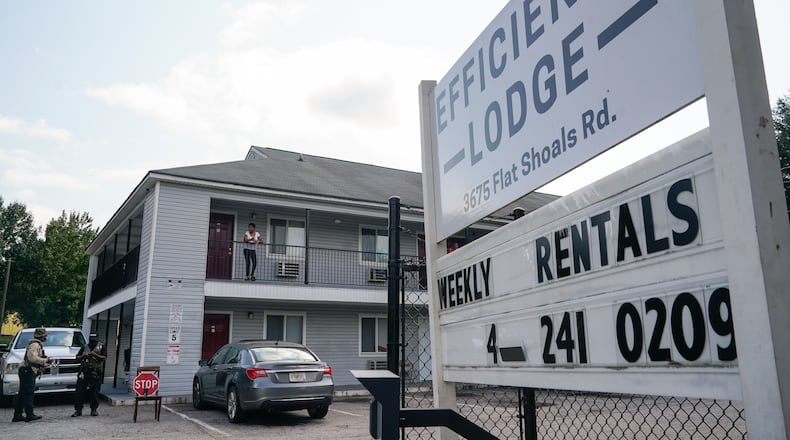Advocates for vulnerable families staying in extended-stay hotels have sounded the alarm over a statehouse bill that would allow hotel owners to enlist law enforcement to evict people who fall behind on payments or try to claim occupancy as tenants.
House Bill 183, or The Innkeeper Reform Act, was introduced by Marietta Republican and state Rep. Devan Seabaugh in January. Last year, Seabaugh rode a wave of controversy about people illegally squatting in homes in Atlanta and Georgia to lead the effort to pass the Georgia Squatter Reform Act, which Gov. Brian Kemp signed into law in April last year.
Seabaugh said his latest bill is an attempt to protect business owners and make it quicker and easier to remove people who assert the right to live at a hotel and won’t leave. If the bill passes the statehouse and is signed into law, hotels could avoid a lengthy eviction process through the courts and ask law enforcement to remove people instead.
“This is about property owner rights and guests that overstay their welcome, or guests that are not paying for the room that they’re occupying,” he said. “The hotel owner has a right to be paid for the services that they provide. If they’re not being paid, then the occupant doesn’t have the right to stay there.”
Credit: Seeger Gray / AJC
Credit: Seeger Gray / AJC
The worst extended-stay hotels in the Atlanta metro region are run in the shadows, according to housing advocates, with people living in the hotels entering a vicious cycle, moving from one place to the next. Day rates at some hotels are on par with what some people could expect to pay in rent for an apartment. Some residents that The Atlanta Journal-Constitution interviewed this past year said they were paying nearly $1,300 each month to stay in hotel rooms while living day-to-day and paycheck-to-paycheck.
In a Feb. 6 statement, the Georgia House of Representatives said the bill “would close a loophole in state squatter laws that allows long-term hotel guests to illegally squat in extended-stay hotels” and “seeks to redefine extended-stay hotel guests who refuse to leave after their reservation expires as trespassers rather than tenants.”
But residents are already at the whim of hotel owners and largely powerless when management decides to make them leave, said real estate agent Sue Sullivan, who advocates for families living in extended stays. Conditions at some hotels are deplorable, where people live in rooms with mold and bugs. The hotels are also magnets for sex trafficking and violent crime, she told the AJC.
Any new law could further alienate a vulnerable population for whom the hotels are a last resort against homelessness, according to Sullivan.
“They’re working as hard as they can, as many jobs as they can, to keep a roof over their head,” Sullivan said. “They’re not squatters. These are hardworking people.”
Seabaugh suggested the bill’s intent was not to punish people but to protect business owners.
“I’m not trying to make the homeless population any worse than it is. If they’re using extended stays for that purpose, I think that’s great. But if somebody’s staying in a room and not paying, then (hotel owners) can’t rent that room to a paying customer, which hits them financially.”
Erin Willoughby, managing attorney at Atlanta Legal Aid Society, said her organization is not taking a position on the bill and could only talk about its potential impacts.
If the bill is passed and signed into law, it would prevent residents, including the elderly and people with disabilities, from seeking a remedy in eviction court, according to the attorney.
“These are people who have no other options. No one lives voluntarily in a hotel setting. This is their home,” she said. “Those people would be stripped of the ability to be protected by the landlord-tenant statute.”
State courts had ruled on extended stays in a case in which residents of the Efficiency Lodge in DeKalb County sued after hotel managers said they would have to leave, without going to court to evict them. According to the Southern Poverty Law Center, some residents had been forced from their rooms by a private security guard with an assault rifle.
In 2022, the appeals court affirmed a trial court ruling in favor of the residents and found that the hotel was acting as a landlord and had to go through a formal eviction process.
In Georgia, the landlord-tenant relationship established in a typical lease agreement means property managers need to go through the formal process to evict a tenant. Guests in hotels have fewer protections. But in June 2023, the state Supreme Court said a landlord-tenant relationship could be implied for longtime residents in hotels, depending on the circumstances.
“Even without an express agreement, the parties’ intent to transfer the right of possession may be discerned through evidence from the parties’ arrangement and the circumstances as a whole,” Justice Andrew A. Pinson wrote in the ruling.
The state’s highest court remanded the case, Efficiency Lodge, Inc. v. Neason, back to the trial court judge based on the legal framework outlined in the ruling.
Willoughby said there is no “simple answer to when someone becomes a tenant” and that it depends on a variety of factors.
“They’ve been there for an extended period of time. They get mail there. They have children who are picked up from school there — those people may have crossed the line into having a landlord-tenant relationship,” the attorney said.
Credit: Jenni Girtman
Credit: Jenni Girtman
Few people living at the hotels know they have any rights, much less how to enforce them, according to Sullivan. She doubts many have heard about the new bill or know what might be coming.
Seabaugh said he had relied on feedback from the hotel industry before proposing the bill.
“I take their word that it’s a problem,” he said.
As the debate gains traction, an ongoing legal dispute is unfolding in state court, spurred by extended-stay hotel operator S&A Suites, which owns Budgetel Inns and Suites in the Gwinnett County city of Lilburn. The company petitioned a county judge in October after it said Gwinnett County Sheriff Keybo Taylor refused to enforce the Georgia Squatter Reform Act when the hotel tried to have officers remove several residents.
According to the petition, the sheriff’s legal department told the hotel that if it wanted to remove the residents it should do so through eviction court. The hotel wants the judge to order the sheriff’s department to eject the residents.
The Georgia House of Representatives’ statement said the Georgia Hotel & Lodging Association, a vocal supporter of the legislation, believes the bill “will help prevent fraud and abuse while protecting hotel employees from confrontational incidents.”
The association did not respond to a request for comment.
“Law enforcement officials have also backed the bill, saying that it will eliminate confusion when responding to disputes between hotels and overstaying guests,” statehouse officials said.
About the Author
Keep Reading
The Latest
Featured




